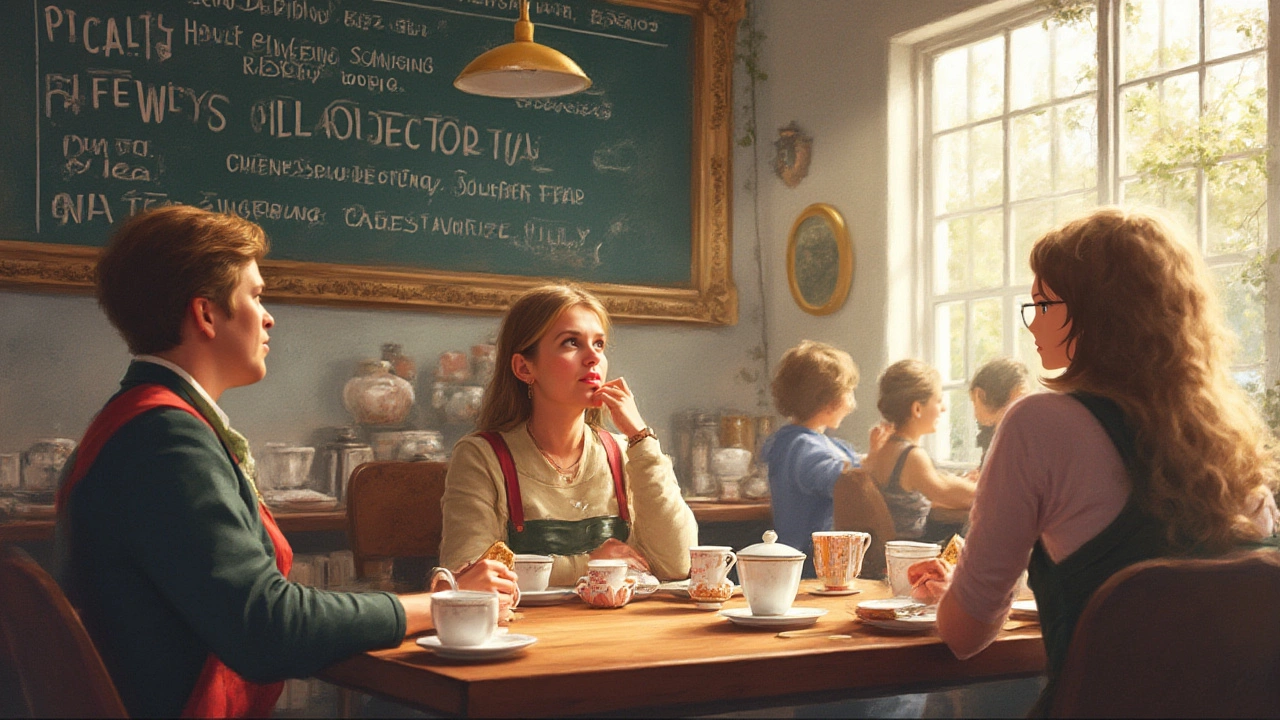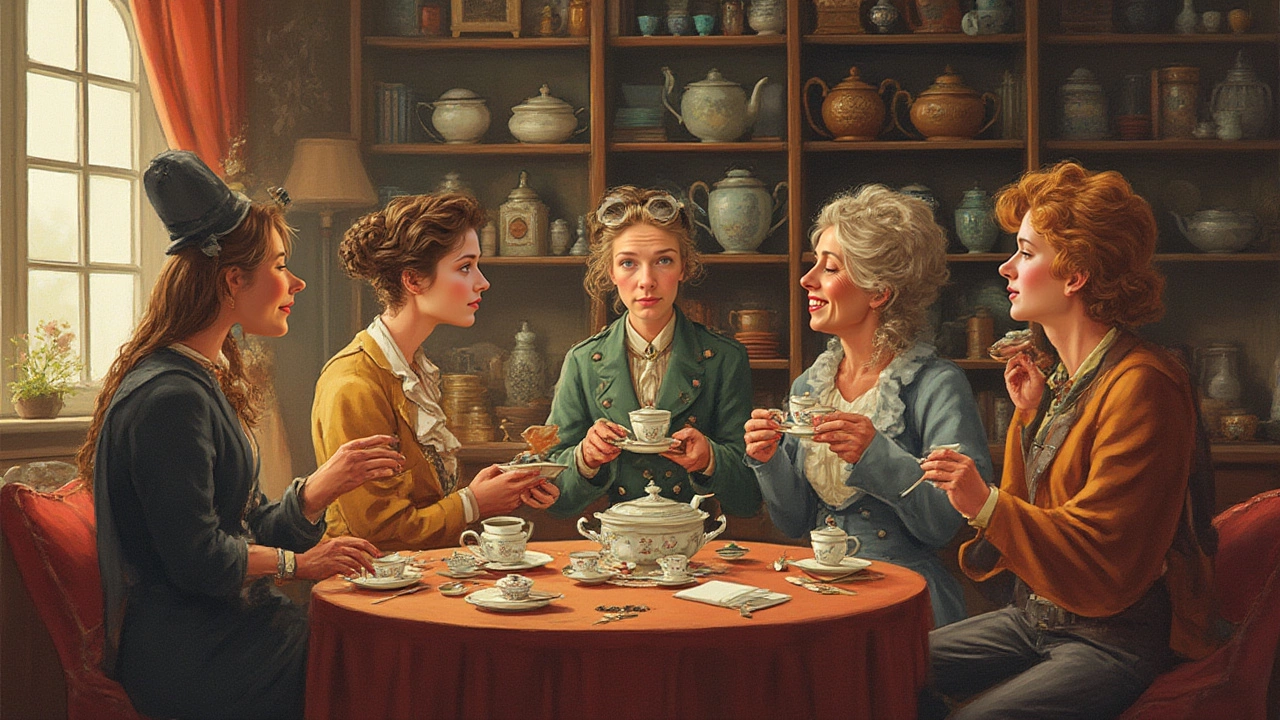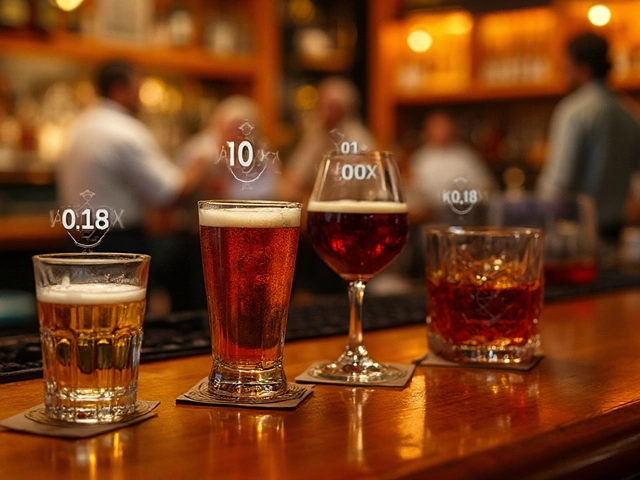You’d think coffee had the monopoly on obsession, but walk into any Aussie kitchen mid-afternoon and you’ll find the kettle’s doing overtime. Tea isn’t just a drink here; it’s comfort, tradition, and let’s be real—sometimes a bit of a crutch. Tea drinkers have built a whole language around their love, so what’s the label for someone who can’t resist a brew? People call them plenty of things, but is there an official word? Why do we crave tea so much, and where’s the line between enjoying a cuppa and needing one just to function?
Tea Addict: What’s in the Name?
Call them a tea lover, a tea enthusiast, or even a teapot tragic, but to get specific, the term people land on most is teaholic. It’s got the same punch as ‘alcoholic’, but swap whisky for Earl Grey and there you go. You might also hear ‘teahead’ or ‘tea fiend’ tossed around, but these are rarer. Nobody’s ever really seen ‘theine addict’ outside of a textbook (that’s someone hooked on the caffeine in tea). Strangely, English doesn’t have an old-school, official word for hardcore tea fans, even though the phenomenon is centuries old, especially in places like Britain, China, India, and right here in Australia.
Let’s look at how other cultures play the naming game. The Japanese sometimes call passionate tea fans “ocha-zuki” (茶好き), meaning “tea liker”, which sounds tame by addiction standards. The Russians, heavy consumers of black tea, just say “chainik lyubitelya” (чайник любителя)—literally “kettle lover.” No spicy Latin term, like ‘cafeinomane’ for coffee obsessives. So, ‘teaholic’ sort of stuck. Weirdly, it only really caught on after the 1970s, inspired by similar -holic words.
But it’s not just about the word—it’s the culture wrapped around it. Tea breaks are sacred across workplaces, schools, and homes. In the UK, people drink more than 100 million cups daily; in Australia, we don’t lag far behind, clocking almost 10 cups per person per week. There’s pride in knowing your Darjeeling from your Sencha or your builder’s tea from a fancy blooming flower tea. If there’s a label missing from the Oxford Dictionary, rest assured, tea drinkers make up for it with their stories and rituals.
Just how far does the obsession go? Back in 2012, a British health survey found that the average Brit gets more antioxidants from tea than any other source—fruit included! Tea time isn’t about caffeine alone; it’s ritual, family, and sometimes the one social rule everyone honours. So, maybe there isn’t an ‘official’ word for a tea addict the way there is for wine lovers (oenophiles), but anyone who jumps up at the sound of a whistling kettle knows exactly where they stand.

Why Are We So Drawn to Tea?
Ever wondered why people get so wrapped up in tea? Sure, there’s the caffeine hit—though tea typically has less than coffee, it’s got enough for a gentle buzz. Here’s the magic bit: the caffeine in tea’s bound up with another compound called L-theanine. L-theanine smooths out caffeine’s peaks, giving that steady, “calm energy” experienced tea drinkers swear by. You don’t get the coffee jitters, and instead, you’re quietly ready for the next round of emails or chats.
The ritual itself is half the addiction. Making tea is a built-in self-care break: boiling water, waiting for the brew, taking the time to pour and sip. These steps slow you down. People crave that pause. In a 2023 study from the University of Sydney, researchers found that people who built teas into their routines reported lower daily stress. The act of brewing—hands on, senses engaged, anticipation—can really turn an ordinary moment into something special.
Sugar cravings play their part, too. Many people dollop honey, sugar, or milk into their cups. The brain gets a double whammy: a warm drink with just enough sweetness to hit those pleasure centres. Some blends even include natural perfumes or spices, like chai’s cinnamon and cardamom, which add to the sense of luxury.
Then there’s nostalgia. For heaps of us, tea tastes like home. It’s grandma’s kitchen, rainy arvos, or mates pulling you aside for a vent and a biscuit. That’s not just emotion talking—there’s genuine neuroscience behind it. Smells and tastes connect directly to the limbic system, the part of your brain that remembers feelings. Sip after sip, tea is a shortcut to comfort.
Health fads play their part, too. Tea’s loaded with polyphenols and flavonoids, those antioxidants everyone loves to hype up. Here’s some actual data:
| Tea Type | Main Antioxidant (per 240ml) | Approx. Caffeine (mg) |
|---|---|---|
| Black | Flavonoids (Theaflavins) | 40-70 |
| Green | Catechins (ECGC) | 20-45 |
| Oolong | Flavonols | 30-50 |
| Herbal (e.g. Rooibos) | Aspalathin, Not a true tea | 0 |
So, part of the draw is that people actually believe they’re doing themselves a favour. Studies show a link between tea drinking and heart health, lower stress, and improved digestion. That’s the excuse tea addicts will serve to anyone who jokes about their fifth brew before noon.
If you find yourself reaching for tea constantly, it might surprise you that tea withdrawal is a real thing. Symptoms can include headaches, fatigue, and irritability. But, unless you’re mainlining litre after litre, it doesn’t tend to last long. Most doctors agree that drinking several cups a day—unless you load up on sugary extras—won’t hurt. In fact, those focusing on hydration or cutting back on coffee might find tea a mellow, tasty alternative.

Living with Tea Addiction: Perks, Pitfalls, and Curiosities
So, what’s day-to-day life like for a self-acknowledged teaholic? Here’s how you know you (or someone you know) qualifies: every problem seems smaller with a cuppa in hand, and the kitchen’s always stocked better with tea bags than actual food. Running out of milk is a crisis. Teaholics remember where coworkers keep their favourite blends. There’s serious talk about the ‘right’ temperature, steep time, or even which mug is best. These micro-rituals help shape bigger habits—and sometimes small obsessions.
Now, tea addiction isn’t likely to wreck your life. Unlike other dependencies, physical dangers are rare unless you’re clocking 10+ strong cups daily. Still, too much tannin can sometimes affect how your body absorbs iron, and drinking super hot tea can, in rare cases, be linked to oesophageal issues. If you suffer from insomnia, it pays to keep tabs on your total caffeine since even tea can interfere with sleep if you hit the leaves too late in the evening.
Let’s talk numbers, though. Australians drink over 15,000 tonnes of tea each year. Worldwide, tea is second only to water for most drunk beverage; over 2 billion people will reach for a brew today. The most dedicated drinkers (think Turkey and the UK) will have more than 6 glasses a day. If you’re part of the growing club seeking proper loose-leaf, you’re probably also sniffing out local specialty tea shops, fancy infusers, or chasing exclusive blends online.
Here are tips for managing your tea routine if you feel like the kettle’s always on:
- Switch it up: Try herbal teas or rooibos for some brews, especially in the late arvo.
- Mind your sugar: Excess sweeteners can undo those health perks fast.
- Pay attention to your body: If you notice headaches, dry mouth, or sleep trouble, cut back a bit.
- Embrace the ritual, not just the caffeine: Try enjoying the process—maybe a special mug or quiet corner—to enjoy mindful tea breaks minus the overload.
- Keep an eye on your mugs: Ever find yourself washing up three in one go? It happens to the best of us.
Did you know there are international tea competitions, like Australia’s Golden Leaf Awards, where experts debate the best blends? And in Japan, the art of tea (chanoyu) can take years to master. In the tea capital of Hangzhou, locals grade their beloved Longjing green tea on everything from leaf shape to fragrance. Tea addiction isn’t just about quantity—it’s about curiosity and the pleasure of making tiny improvements in your daily cup.
If you’re proud to be a teaholic, own it. There’s endless variety—the quirky teapots, the fancy strainers, the secret blends only your aunt knows how to brew. Maybe you’re a morning English Breakfast loyalist, or perhaps you moonlight with matcha when you’re feeling fancy. Either way, you’re in good company. Across ages, backgrounds, and hemispheres, tea addiction finds a way to brew comfort and connection, one hot mug at a time.


